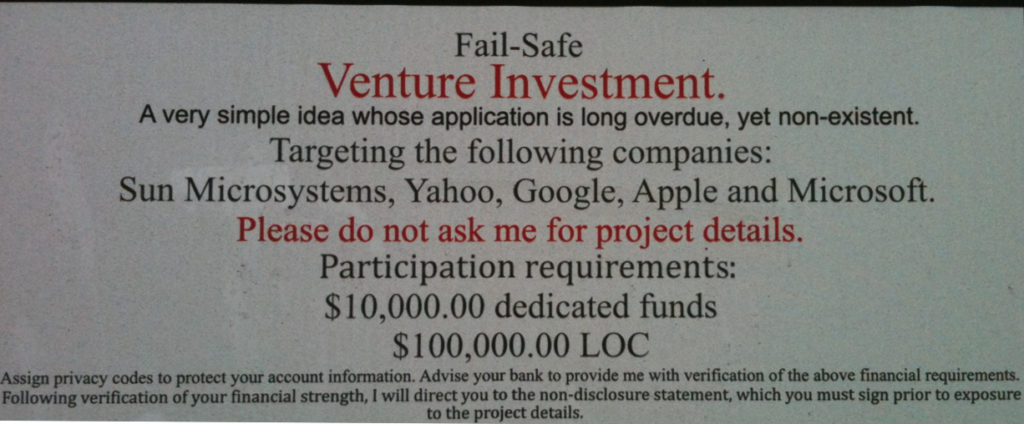Take Investment Dollars and Keep Them
Starting a new beverage manufacturing business takes more than a good beverage, it takes money. Selling ownership shares in your business is an attractive source of start-up funding, but it’s risky. When you take money from investors in exchange for ownership, two things are true. First, your investors expect you to deliver on your promises about the success of the business. Second, federal and state securities laws make you responsible for those promises.
What happens when you don’t deliver on your promises or you violate federal or state securities laws? Often you have to give investors their money back, and that’s the best case scenario.
If you’re planning on asking for investors funding, here are some tips.
Consider the Alternatives
It’s possible to raise money without selling ownership in your business, and without dealing with securities laws. Here are some alternatives:
- Commercial loan. Finding a commercial lender might be tough, but your obligations in a commercial loan are clear: make timely loan payments and you’re safe.
- Private loan. Documenting a loan from one or more generous backers requires some legal work, but not as much as selling ownership shares. Like a commercial loan, a private loan spells out your payment obligations .
- Non-equity crowdfunding. Kickstarter, CrowdBrewed, and other platforms have made non-equity crowdfunding easier than ever. Supporters give you relatively small amounts in exchange for benefits and merch (but not ownership shares, which isn’t allowed in Florida).
Know Your Potential Investors
If you’re going to ask people to be investors in your business, you better know them really, really well. This is true for two reasons.
First, as co-owners, investors have a big impact on your business. You will have to keep them updated about the business’s performance, and they’ll have the ability to vote on major decisions. Investors with a 10% share or greater must also be included on your federal and state alcoholic beverage license applications. The government wants to know about their bankruptcies, arrests, and history, so you should know about them first.
Second, federal securities law requires that you know your investors. You must know that your potential investors have sufficient knowledge and experience in business and financial matters to fairly evaluate your business and its risks. You also have to know about potential investors’ financial status. Federal rules limit you to offering ownership to not more than 35 potential investors, unless they are wealthy “accredited investors.”
Explain Everything in Plain English (or Spanish)
When you are talking to potential investors, you must explain everything to them. You must explain your business plan, how you will use their investment dollars, whether they can take it back, what they will get for their investment, whether they can transfer their ownership shares, what they get to vote on, and what risks are involved in their investments. This explanation must be in plain English, or Spanish, or French, or whatever other language your potential investors speak. Its your job to make sure they understand what you tell them about the investment, the business, and the risks. You have to allow potential investors to ask questions, and if you provide additional information to one potential investor, you must provide the same information to all potential investors.
Let Them Out
Under state securities law, if you sell ownership shares to five of more people in Florida, all investors have 3 days to back out. This three-day backing-out period doesn’t start running until you have told an investor that he or she has the right to get all his or her money back for no reason. Clearly, you should tell investors about this right to back out as soon as possible, while investors are still feeling good about their investments.
Put It All in Writing
Everything should be in writing. What you tell potential investors about the business, their investments, and the risks should be in writing. What potential investors tell you about their financial status should be in writing. Disclosure about the three-day withdrawal period should be in writing. The investors’ agreement to make his or her investment should be in writing.
Not only should everything be in writing, you should stick to the script. Complying with federal and state securities laws is all about what you tell investors and what they tell you, so there shouldn’t be anything that isn’t in the written documents. Those written documents are going to be the only thing to save you if a disgruntled investor accuses you of making pie-in-the-sky promises about his or her investment. If it’s all in writing, and you’re practice is never to deviate from the writing, you can defend yourself against unfounded accusations.
We help you by preparing those written documents. They’re often called Private Placement Memoranda or Offering Documents. They are a collection of documents that include your business plan, discussion of risks, and company operating agreement. We also prepare the Subscription Agreement, which includes the disclosures you need from investors and their agreement to make the investment after being fully informed. When you get that signed Subscription Agreement, you should have comfort knowing that you can legally use those investment dollars to fund your business.


